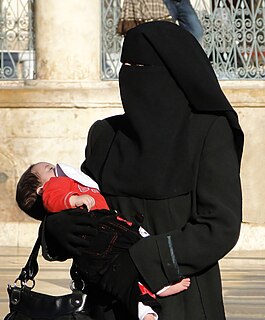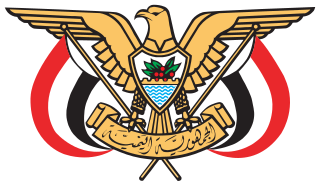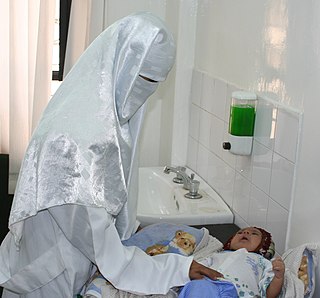Related Research Articles

A niqāb or niqaab, also called a ruband, is a garment of clothing that covers the face, worn by some Muslim women as a part of a particular interpretation of hijab. The terms niqab and burqa are often confused; a niqab covers the face while leaving the eyes uncovered, while a burqa covers the entire body from the top of the head to the ground, with only a mesh screen allowing the wearer to see in front of her. According to the majority of Muslim scholars and Islamic schools of thought, face veiling is not a requirement of Islam; however a minority of Muslim scholars, particularly among the Sunni Wahabi movement, assert that women are required to cover their faces in public. Those Muslim women who wear the niqab do so in places where they may encounter non-mahram (non-related) men.
A combination of Islam and feminism has been advocated as "a feminist discourse and practice articulated within an Islamic paradigm" by Margot Badran in 2002. Islamic feminists ground their arguments in Islam and its teachings, seek the full equality of women and men in the personal and public sphere, and can include non-Muslims in the discourse and debate. Islamic feminism is defined by Islamic scholars as being more radical than secular feminism and as being anchored within the discourse of Islam with the Quran as its central text. As a "school of thought", it is said to refer to Moroccan sociologist "Fatema Mernissi and scholars such as Amina Wadud and Leila Ahmed".

The House of Representatives is the lower house of the Parliament of Yemen. It shares the legislative power with the Shura Council, the upper house. The Assembly of Representatives has 301 members, elected for a six-year term in single-seat constituencies.

Use of the Internet in Yemen began in 1996 through the ISPs TeleYemen and the Public Telecommunications Corporation. By July 2016 6,732,928 people were Internet users.

Human rights in Yemen are seen as problematic in numerous ways. The security forces have been responsible for torture, inhumane treatment and even extrajudicial executions. In recent years there has been some improvement, with the government signing several international human rights treaties, and even appointing a woman, Dr. Wahiba Fara’a, to the role of Minister of the State of Human Rights.

The Houthi insurgency in Yemen, also known as the Houthi rebellion, Sa'dah War, or Sa'dah conflict, was a military rebellion pitting Zaidi Shia Houthis against the Yemeni military that began in Northern Yemen and has since escalated into a full-scale civil war. The conflict was sparked in 2004 by the government's attempt to arrest Hussein Badreddin al-Houthi, a Zaidi religious leader of the Houthis and a former parliamentarian on whose head the government had placed a $55,000 bounty. Initially, most of the fighting took place in Sa'dah Governorate in northwestern Yemen, but some of the fighting spread to neighbouring governorates Hajjah, 'Amran, al-Jawf and the Saudi province of Jizan. After the Houthi takeover of the capital city Sana'a in late 2014, the insurgency became a full-blown civil war with a major Saudi-led intervention in Yemen beginning in March 2015.

The roles of women in the Arab world have changed throughout history, as the culture and society in which they live has undergone important transformations. Historically, as well as presently, the situation of women differs greatly between Arabic speaking regions, their urban or rural population and age groups. Among other factors, these differences can be attributed to local traditions, culture and religion, women's social or legal status, their level of education, health or self-awareness. Since the 19th century, and notably through the influence of the colonization in North Africa, the Arab Renaissance in Egypt, Lebanon, and Syria, and the end of the Ottoman Empire, the social and economic changes in the Arab world have become greatly accelerated and diversified.
Ethar El-Katatney is a Saudi Arabian-born Egyptian journalist.

Amat Al Alim Alsoswa is a Yemeni journalist, and Yemen's first female ambassador and minister.

Women in Yemen have historically been placed at a disadvantage due to their sex, with a highly patriarchal society. Although the government of Yemen has made efforts that will improve the rights of women in Yemen, many cultural and religious norms, along with poor enforcement of this legislation from the Yemeni government, have prevented Yemeni women from having equal rights to men.

Tawakkol Abdel-Salam Khalid Karman is a Yemeni Nobel Laureate, journalist, politician, and human rights activist. She leads the group "Women Journalists Without Chains," which she co-founded in 2005. She became the international public face of the 2011 Yemeni uprising that is part of the Arab Spring uprisings. In 2011, she was reportedly called the "Iron Woman" and "Mother of the Revolution" by some Yemenis. She is a co-recipient of the 2011 Nobel Peace Prize, becoming the first Yemeni, the first Arab woman, and the second Muslim woman to win a Nobel Prize.

The Yemeni Congregation for Reform, frequently called al-Islah, is a Yemeni Islamist party founded in 1990 by Abdullah ibn Husayn al-Ahmar, Ali Mohsen al-Ahmar, Abdul Majeed al-Zindani, Mohammed al-Yadumi and Yahya Rassam. The first article of Islah basic law defines it as "a popular political organization that seeks reform of all aspects of life on the basis of Islamic principles and teachings".
Nadia Al-Kokabany is a Yemeni novelist, short story writer and academic. She was born in Taiz and studied architecture at Sanaa University. She completed a PhD in architecture at Cairo University in 2008, before returning to take up an academic position at Sanaa University.

The International Women of Courage Award, also referred to as the U.S. Secretary of State's International Women of Courage Award, is an American award presented annually by the United States Department of State to women around the world who have shown leadership, courage, resourcefulness, and willingness to sacrifice for others, especially in promoting women's rights.
Maria Al-Masani is a Yemeni and Canadian fashion designer and public relations executive who co-founded the Yemen Rights Monitor, a blog to record human rights violations. In 2012, she was named as one of eight 'agents of change' by CNN's Inside the Middle East.

Women in law describes the role played by women in the legal profession and related occupations, which includes lawyers, paralegals, prosecutors, judges, legal scholars, law professors and law school deans.

Disability in Yemen has been increasing over time, especially because of increased conflict in the area. Disabled people in Yemen face many challenges due to poverty, lack of accessible infrastructure, gender segregation and more. The government of Yemen has passed laws to help protect the rights of the disabled in their country, but not all laws are equally enforced.

Yasmin Al Qadhi is a Yemeni journalist who rescues child soldiers. She was chosen as an International Woman of Courage in March 2020.
References
- ↑ Second woman declares intention to make bid for presidency, SANA'A, 15 March 2006 irinnews.org, Retrieved 14 April 2016
- ↑ "Yemen: CEDAW Shadow Report highlights persisting discriminative laws | Women Reclaiming and Redefining Cultures". www.wluml.org. Retrieved 2018-05-29.
- ↑ NPR
- ↑ "Saba Net - Yemen news agency". sabanews.net. Retrieved 2018-05-29.
- ↑ Manea, Elham (2010-03-03). "Women's Rights in the Middle East and North Africa 2010 - Yemen". Freedom House. Retrieved 2018-05-29.